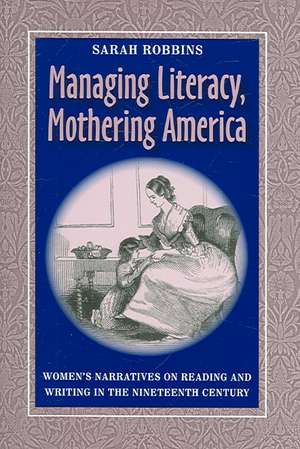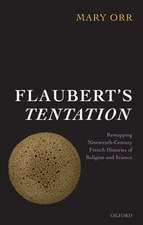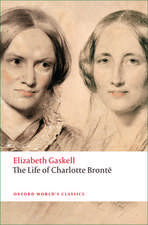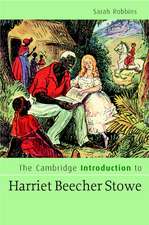Managing Literacy, Mothering America: Women's Narratives on Reading and Writing in the Nineteenth Century: Composition, Literacy, and Culture
Autor Sarah Robbinsen Limba Engleză Paperback – 2 feb 2006
Managing Literacy, Mothering America accomplishes two monumental tasks. It identifies and defines a previously unstudied genre, the domestic literacy narrative, and provides a pioneering cultural history of this genre from the early days of the United States through the turn of the twentieth century.
Domestic literacy narratives often feature scenes that depict women-mostly middle-class mothers-teaching those in their care to read, write, and discuss literature, with the goal of promoting civic participation. These narratives characterize literature as a source of shared knowledge and social improvement. Authors of these works, which were circulated in a broad range of publication venues, imagined their readers as contributing to the ongoing formation of an idealized American community.
At the center of the genre's history are authors such as Lydia Sigourney, Catharine Maria Sedgwick, and Frances Harper, who viewed their writing as a form of teaching for the public good. But in her wide-ranging and interdisciplinary investigation, Robbins demonstrates that a long line of women writers created domestic literacy narratives, which proved to be highly responsive to shifts in educational agendas and political issues throughout the nineteenth century and beyond.
Robbins offers close readings of texts ranging from the 1790s to the 1920s. These include influential British precursors to the genre and early twentieth-century narratives by women missionaries that have been previously undervalued by cultural historians. She examines texts by prominent authors that have received little critical attention to date-such as Lydia Maria Child's Good Wives--and provides fresh context when discussing the well-known works of the period. For example, she reads Uncle Tom's Cabin in relation to Harriet Beecher Stowe's education and experience as a teacher.
Managing Literacy, Mothering America is a groundbreaking exploration of nineteenth-century U.S. culture, viewed through the lens of a literary practice that promoted women's public influence on social issues and agendas.
Domestic literacy narratives often feature scenes that depict women-mostly middle-class mothers-teaching those in their care to read, write, and discuss literature, with the goal of promoting civic participation. These narratives characterize literature as a source of shared knowledge and social improvement. Authors of these works, which were circulated in a broad range of publication venues, imagined their readers as contributing to the ongoing formation of an idealized American community.
At the center of the genre's history are authors such as Lydia Sigourney, Catharine Maria Sedgwick, and Frances Harper, who viewed their writing as a form of teaching for the public good. But in her wide-ranging and interdisciplinary investigation, Robbins demonstrates that a long line of women writers created domestic literacy narratives, which proved to be highly responsive to shifts in educational agendas and political issues throughout the nineteenth century and beyond.
Robbins offers close readings of texts ranging from the 1790s to the 1920s. These include influential British precursors to the genre and early twentieth-century narratives by women missionaries that have been previously undervalued by cultural historians. She examines texts by prominent authors that have received little critical attention to date-such as Lydia Maria Child's Good Wives--and provides fresh context when discussing the well-known works of the period. For example, she reads Uncle Tom's Cabin in relation to Harriet Beecher Stowe's education and experience as a teacher.
Managing Literacy, Mothering America is a groundbreaking exploration of nineteenth-century U.S. culture, viewed through the lens of a literary practice that promoted women's public influence on social issues and agendas.
Din seria Composition, Literacy, and Culture
-
 Preț: 426.79 lei
Preț: 426.79 lei -
 Preț: 430.66 lei
Preț: 430.66 lei -
 Preț: 426.79 lei
Preț: 426.79 lei -
 Preț: 390.71 lei
Preț: 390.71 lei -
 Preț: 388.79 lei
Preț: 388.79 lei -
 Preț: 139.00 lei
Preț: 139.00 lei -
 Preț: 425.86 lei
Preț: 425.86 lei -
 Preț: 388.79 lei
Preț: 388.79 lei -
 Preț: 388.79 lei
Preț: 388.79 lei -
 Preț: 348.83 lei
Preț: 348.83 lei -
 Preț: 210.43 lei
Preț: 210.43 lei -
 Preț: 199.10 lei
Preț: 199.10 lei -
 Preț: 181.71 lei
Preț: 181.71 lei -
 Preț: 422.97 lei
Preț: 422.97 lei -
 Preț: 388.79 lei
Preț: 388.79 lei -
 Preț: 394.57 lei
Preț: 394.57 lei -
 Preț: 386.88 lei
Preț: 386.88 lei -
 Preț: 362.33 lei
Preț: 362.33 lei -
 Preț: 446.05 lei
Preț: 446.05 lei -
 Preț: 390.71 lei
Preț: 390.71 lei -
 Preț: 391.67 lei
Preț: 391.67 lei -
 Preț: 383.01 lei
Preț: 383.01 lei -
 Preț: 358.46 lei
Preț: 358.46 lei -
 Preț: 197.45 lei
Preț: 197.45 lei -
 Preț: 388.79 lei
Preț: 388.79 lei -
 Preț: 359.07 lei
Preț: 359.07 lei -
 Preț: 349.99 lei
Preț: 349.99 lei -
 Preț: 356.55 lei
Preț: 356.55 lei -
 Preț: 387.82 lei
Preț: 387.82 lei -
 Preț: 360.37 lei
Preț: 360.37 lei -
 Preț: 392.66 lei
Preț: 392.66 lei -
 Preț: 425.86 lei
Preț: 425.86 lei -
 Preț: 424.88 lei
Preț: 424.88 lei -
 Preț: 391.67 lei
Preț: 391.67 lei -
 Preț: 386.88 lei
Preț: 386.88 lei -
 Preț: 348.83 lei
Preț: 348.83 lei -
 Preț: 386.88 lei
Preț: 386.88 lei -
 Preț: 389.38 lei
Preț: 389.38 lei -
 Preț: 385.91 lei
Preț: 385.91 lei -
 Preț: 384.92 lei
Preț: 384.92 lei -
 Preț: 385.91 lei
Preț: 385.91 lei -
 Preț: 384.00 lei
Preț: 384.00 lei -
 Preț: 426.79 lei
Preț: 426.79 lei -
 Preț: 426.79 lei
Preț: 426.79 lei -
 Preț: 350.79 lei
Preț: 350.79 lei -
 Preț: 386.88 lei
Preț: 386.88 lei -
 Preț: 350.79 lei
Preț: 350.79 lei -
 Preț: 383.01 lei
Preț: 383.01 lei -
 Preț: 350.79 lei
Preț: 350.79 lei -
 Preț: 385.91 lei
Preț: 385.91 lei
Preț: 422.76 lei
Nou
Puncte Express: 634
Preț estimativ în valută:
80.90€ • 84.63$ • 67.20£
80.90€ • 84.63$ • 67.20£
Carte tipărită la comandă
Livrare economică 03-17 aprilie
Preluare comenzi: 021 569.72.76
Specificații
ISBN-13: 9780822959274
ISBN-10: 0822959275
Pagini: 336
Dimensiuni: 152 x 229 x 20 mm
Greutate: 0.45 kg
Ediția:1
Editura: University of Pittsburgh Press
Colecția University of Pittsburgh Press
Seria Composition, Literacy, and Culture
ISBN-10: 0822959275
Pagini: 336
Dimensiuni: 152 x 229 x 20 mm
Greutate: 0.45 kg
Ediția:1
Editura: University of Pittsburgh Press
Colecția University of Pittsburgh Press
Seria Composition, Literacy, and Culture
Recenzii
“Offers insightful applications of historical materialist standpoint theory, discourse analysis, genre theory, and Jane Thompkin's 'cultural work' model. . . . Robbins's precisely focused analysis is illuminating. . . . [She] is to be commended for scrutinizing both the 'empowering vision' and the 'troubling limits' of domestic literary narratives.”
--The New England Quarterly
--The New England Quarterly
“This fascinating account of 'domestic literary narrative' treats texts that show how 'middle-class maternal teaching through print-text' (i.e., mothers' instruction in reading, writing, and interpreting written works) was essential to the development of the individual and the nation. Essential. All collections.”
--Choice
--Choice
"This elegant, accomplished book is a model of what can be gained when we recognize the relationships of such aspects of American culture as domesticity, educational practices, missionary activity, and social work to American letters."
—Sandra A. Zagarell, Longman Professor of English, Oberlin College
—Sandra A. Zagarell, Longman Professor of English, Oberlin College
Notă biografică
Sarah Robbins, a professor of English at Kennesaw State University in Georgia, is the coeditor of Writing America and Writing Our Communities.
Descriere
Sarah Robbins identifies and defines a new genre in American letters—the domestic literacy narrative—and provides a cultural history of its development throughout the nineteenth century.















